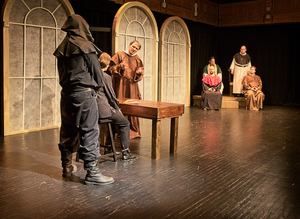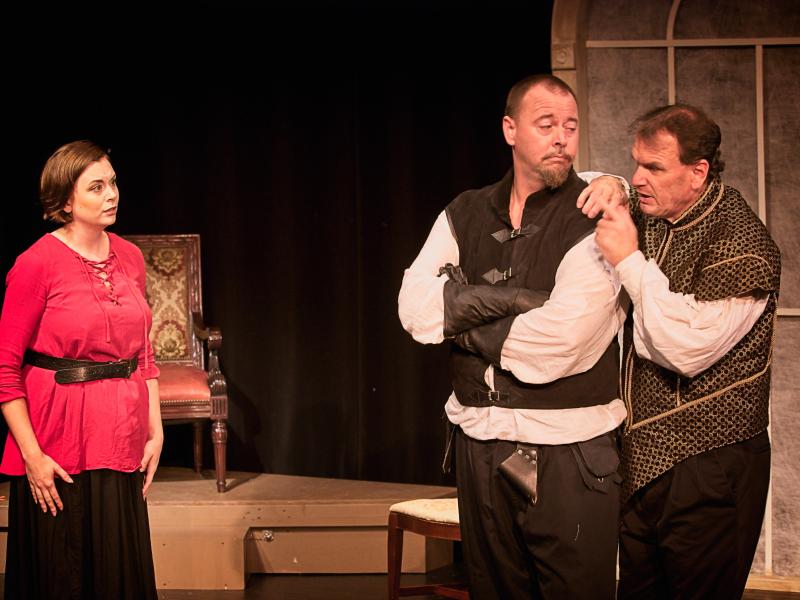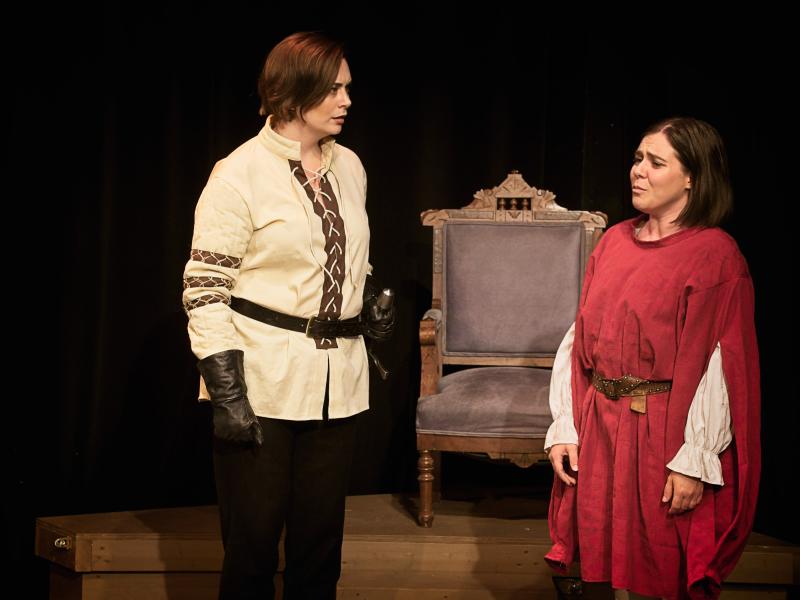Review: Free Reign's SAINT JOAN Handsomely Shaves a Shavian Tragedy

Didacticism and verbosity are probably the chief reasons why George Bernard Shaw has fallen out of favor, even if those charges are often overblown and undeserved. The Anglo-Irish playwright's works, faithfully presented each summer in rotation at the Shaw Festival in beautiful Niagara-on-the-Lake up in Ontario, can seem musty and intimidating compared to today's snappy sitcom dialogue or yesteryear's sleek Oscar Wilde epigrams.
Of course, the more didactic and verbose a GBS play might be, the less a director might feel she or he can reshape it. So there's often a backstage disinclination to wrestle with Shaw's once-revered scripts that conspires with the audience fear factor.
Maybe that explains why the last two Shaw productions I've seen, nearly five years apart, have both been SAINT JOAN. My first live encounter with Shaw's only tragedy was at the Lynn Redgrave Theatre in New York in a lively Bedlam Theatre production. Almost instantly, I could see that this is one play where the playwright has loosened his tight grip on his stage characters. Here the story has a grip on him, and even before I found it confirmed in his humongous preface (more than half the size of the play), it was obvious that he not only deeply researched the exploits of Joan of Arc, but he had also meticulously studied the transcripts of her witchcraft trial.
Actor/director Eric Tucker and his Bedlam cast had a field day with the script, divvying up 25 roles among four actors. Shaw's contention that there was no villain in the Maid of Orleans' undoing came through vividly in an evening that mixed some fun into the high seriousness - but the evening was three hours long, hardly making a dent in GBS's notorious loquacity. The new Free Reign Theatre production, currently at Spirit Square, brings SAINT JOAN more fully into the realm of accessibility. Director David Hensley noticeably shaves the Shavian discourse, and company founder Charles Holmes has free rein to ply his fight directing craft. Multiple episodes of spirited swordplay are sprinkled amid the wordplay.
Hensley deploys four times as many actors on the drama, allowing it to breathe more naturally than Bedlam's insane reduction, where one of the actors might actually change roles mid-sentence and reply to himself. A more benign form of such absurdity persists with Free Reign, where the same French faces we saw opposing and abetting Joan's miraculous rise to military leadership suddenly transform into her enemies in the angry and confounded English camp.

In a role that has been mainly populated by the great dames of theatre history rather than precocious teens, Amy Cheek makes an amazing splash the first time I've seen her in Charlotte. There were times, over the course of the evening, a relatively svelte 2:15 at Duke Energy Theater, when I felt that her excellence was all that was necessary. There is, as her elders say repeatedly, something about her - an ardent belief that infuses a Peter Pan cocksureness yet never crosses over into presumptuous arrogance.
At times, the light radiating from within, kindled for Joan by the voices of the warrior archangel Michael and Saints Margaret and Catherine, made me believe Cheek was the ideal age for this role. Predecessors have included the likes of Uta Hagen, Katharine Cornell, Sybil Thorndike, Judi Dench, and the aforementioned Redgrave.
It tickled me that most of the other Free Reign players did so well - and that Hensley decreed that they aren't all men. Five women flit through this surprisingly nimble evening. Particularly delightful was the idea of having the pert and diminutive Alexandria Creech portraying the timorous Dauphin, the future King Charles VII of France. The holy coronation at Rheims Cathedral can only happen if Joan can prod him into standing up for himself and forcefully claiming his rightful throne. With Russell Rowe thundering as the Archbishop of Rheims, Holmes glowering as military commander-in-chief Monseigneur de la Trémouille, and both of them towering over Creech, chances for an upswell of valor from the Dauphin look slim.
Creech can not only hide behind her courtiers when the Dauphin stages his first audience with Joan, she can nearly disappear. But Cheek also towers over this Dauphin - a little bit - so it's a nifty tug of war for the future king's favor. Holmes retains his bellicosity when he briefly appears at the English encampment as the Black Prince, but he becomes slightly more sympathetic at the trial as Peter Cauchon, somewhat doubtful that La Pucelle is a witch but absolutely certain that she is the worst of heretics.
Rowe follows a more interesting arc when he changes into an Englishman, becoming the implacable and somewhat stupid Chaplain John de Stogumber, who believes so rabidly in Joan's witchery that it's alarming. At the trial, he appears to be a mashup of the Chaplain and the Canon de Courcelles, who zealously brings over 60 charges against The Maid to the bench. Stogumber seethes mightily when Cauchon trims those charges to a mere 12, violently advocating that Joan be burnt at the stake - until he actually sees her on fire. He was so shaken and chastened by the spectacle that I almost pitied him, a truly wrenching turnaround.

The Maid attracts believers and followers along the way, of course, and the most impressive of these are the hulking David Hayes as Bertrand de Poulengey, Joan's first champion, and Robert Brafford as the wily renegade Dunois, who shrewdly sizes up her military acumen. Hayes resurfaces at La Pucelle's side in the pivotal battle scenes before drawing a fearsome, taciturn role as her Executioner. Brafford sheds his good heartedness but retains his craftiness when he becomes The Earl of Warwick. The coolest of Joan's enemies, Warwick is willing to offer a bounty to anyone who betrays The Maid - not the most dramatic thrust in Shaw's script, so I suspect the suave and calculating Brafford was the most victimized by cuts to the script.
Every now and then, as in Boeing Boeing, we get the treat of seeing Emmanuel Barbe in a French role. As Robert de Baudricourt, the first nobleman to be won over by Joan's eloquence and spunk, Barbe helps to get things off to a flavorful start. By the end of the first scene and its exhilarating little coda - and miracle! - this Free Reign production had already captivated me. As Shaw well knew, Joan's story has that power.
Photos: Komadori Photography
Reader Reviews

Videos

